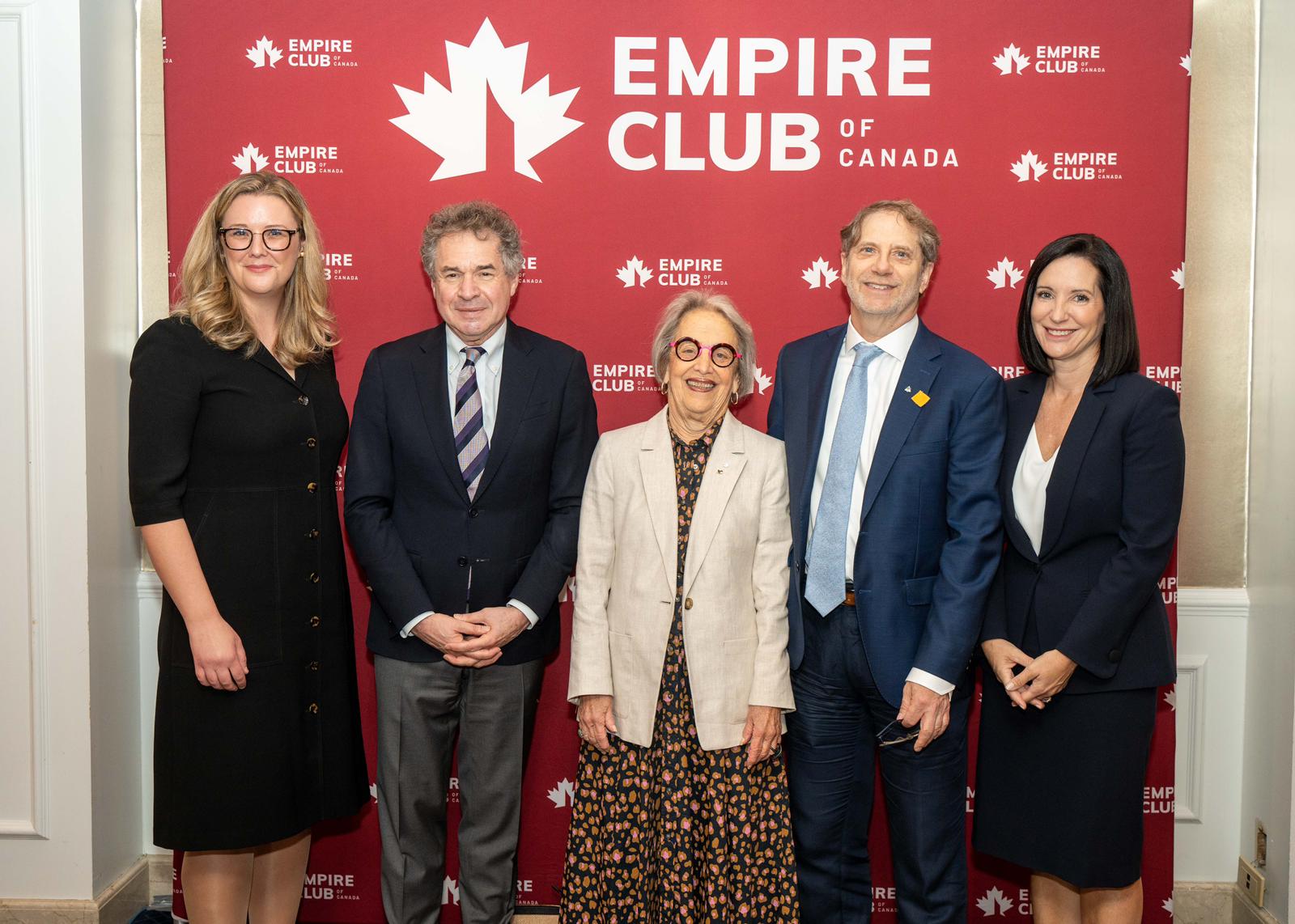
Canada needs to ‘get serious’ about the U.S.
It’s time for Canada to ‘get serious’ and lean into its relationship with the United States regardless of who becomes the next president, expert panelists told the Empire Club of Canada Wednesday afternoon.
Janice Stein, Belzberg Professor of Conflict Management and Founding Director of the Munk School of Global Affairs & Public Policy at the University of Toronto, and Edward Greenspon, President and CEO of the Public Policy Forum, pressed the importance of Canada working smartly to matter more to the U.S. so that it can address key challenges in a fraught 21st Century geopolitical landscape.
“We have no choice — if we are going to continue to grow and provide opportunities for our children and grandchildren — but to understand how to matter more to the United States,” Stein said during the lunchtime panel in Toronto. That phrase – “matter more” – is the title of a new PPF report Stein co-authored with Greenspon and Drew Fagan, a professor at the Munk School.
Stein’s assessment may sound stark, but Matter More: A Canadian strategy for a changing United States, describes Canada as being poised for progress. “We are in a moment of incredible opportunity… Our allies recognize we have valuable assets to offer,” the report states. “But we need a clear-eyed strategy that analyzes effectively how our national interests and those of our partners fit together – and how to maximize them for shared advantage.”
READ MORE: An open letter from five former Canadian ambassadors to the U.S.
The report highlights four key areas in which its authors argue Canada could matter more to the U.S.: critical minerals, arctic security, energy and environment, and technology. And, its authors say, we already have a working model for the kind of deeply integrated cooperative relationship that’s necessary in each area: the Canada-U.S. Auto Pact.
“It’s a very useful metaphor,” Stein explained Wednesday. “For the last 20, 30 years in our relationship with the United States, the focus has been on trade and reducing tariffs and creating more open markets. Unfortunately… that kind of more open, global approach is over, if you know anything about U.S. domestic politics.”
Where does that leave Canada? “We [need to] get above that,” Stein continued. “The Auto Pact took a sector…got above it and reached an agreement in which we integrated those two sectors until today, if you look at a car…we can’t tell you what’s made in the United States and Canada, because the parts cross the border so many times. That’s what we’re talking about now in these four areas.”
Take, for example, critical minerals, which are essential to building the energy infrastructure of the 21st century, including green technologies like wind turbines and electric vehicles. Currently, China accounts for anywhere from 60 to 70 percent of global production of rare earth elements — critical minerals and materials used to produce anything from glass and magnets to battery alloys. Yet, Canada boasts some of the largest known reserves of rare earths in the world and is the only country in the western hemisphere that has copper, cobalt, rare earth elements, graphite, lithium, manganese and nickel deposits.
“Canada needs to get its act together,” Greenspon said Wednesday, pointing out how projects like the Ring of Fire in Ontario have not moved forward significantly for many years. Capital is an issue. Up to now, capital for smaller mining companies has been coming from China, “and that’s no longer acceptable,” Greenspon said.
However, “the Chinese have such control over the market that they can move prices, and they have been using their influence to move prices in a direction that would discourage investment,” Greenspon said.
“So what do you do when your market signals are different than your security signals? …This is a huge issue. Companies need to have an incentive to develop [critical minerals] and the market isn’t giving that incentive and nations need to get that done.”
In short, Canada needs to become a serious country, the panelists agreed — a reference to a recent remark from Royal Bank CEO Dave McKay, who said that in meetings, a senior American CEO had said Canadians “are not serious people.”
Greenspon added: “We are not sufficiently serious as a country, and our politics is not serious, it’s trivialized, it’s angry, it’s not focused on solutions, we don’t have a strong enough consensus around big issues,” including industrial policy.
To be more serious, the way that Canada thinks about its relationship with the U.S. needs to be reframed, Stein said. Rather than assuming that in order to have a relationship with the U.S. Canada must cede control, the definition of power has to change. “Of course they’re more powerful… but that doesn’t mean they don’t need things that we have. Once we begin to think about it that way — what do we have that they need? — that’s a very, very different conversation.”
Crucially, addressing the challenges in one key area will necessarily mean addressing them all in some fashion. As the panel pointed out, figuring out how to make Canada matter more to the U.S. in one place will inherently create or promote the need for further continental cooperation on economy, climate and national security.
That’s true when it comes to obvious areas like protecting the Arctic, but it also applies on more day-to-day, hot-button political issues like tariffs, which the Trump administration imposed in 2020 on steel and aluminum under the auspices of protecting national security.
“But nobody noticed… he did not do it on uranium,” Stein reminded the audience Wednesday. “And why was that? Because the United States needs our uranium. There’s a lesson in that.”
Stay up-to-date on all the cross-border news with PPF’s The Canada-U.S. newsletter. It’s written by a top Canadian columnist and offers insight and analysis from PPF experts and fellows. Subscribe now and get it delivered to your inbox every Thursday morning.


